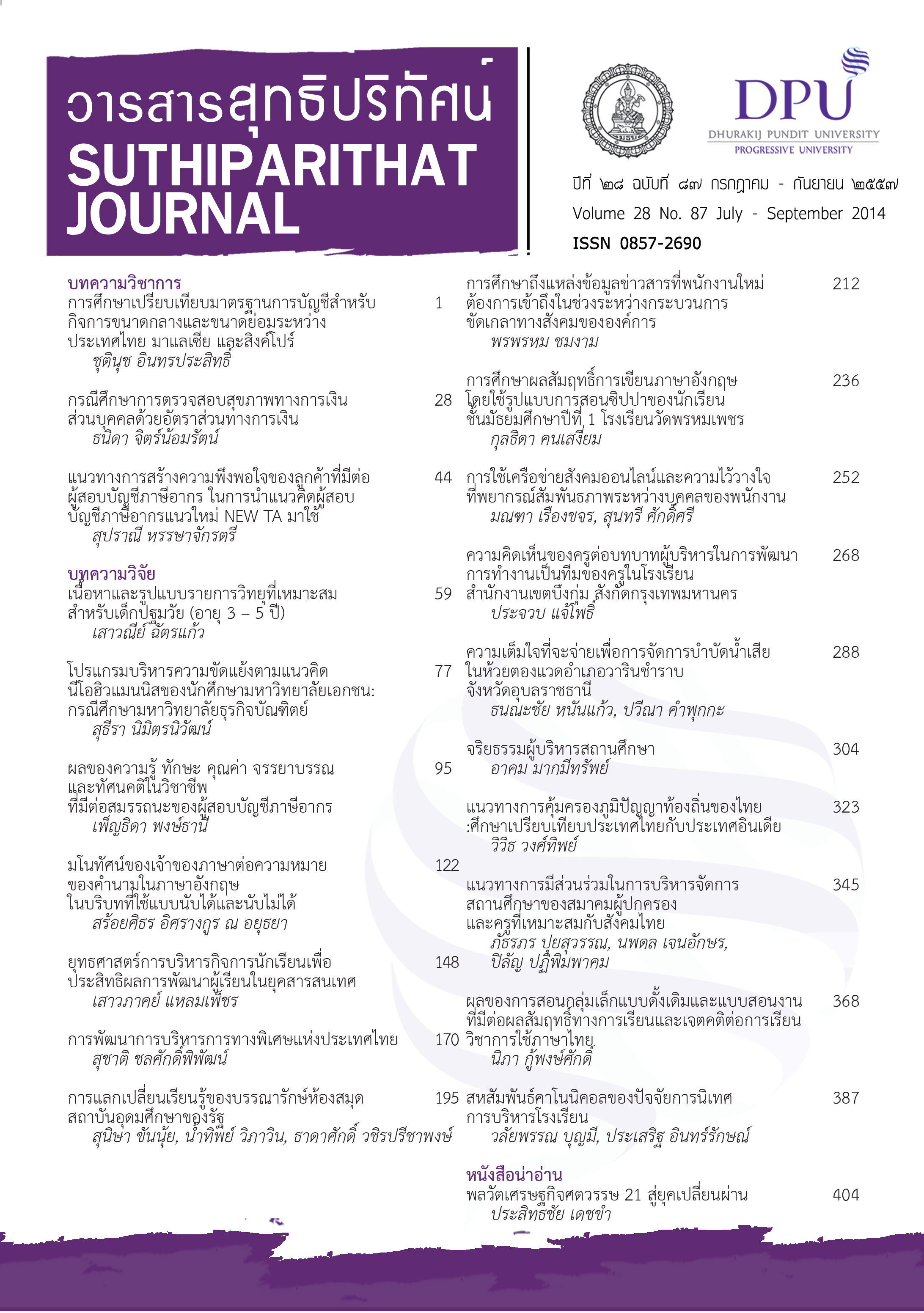การแลกเปลี่ยนเรียนรู้ของบรรณารักษ์ห้องสมุดสถาบันอุดมศึกษาของรัฐ
คำสำคัญ:
การแลกเปลี่ยนเรียนรู้, การจัดการความรู้, ห้องสมุดสถาบันอุดมศึกษาบทคัดย่อ
The objectives of this research were to study 1) knowledge sharing practices of librarians in public university libraries; 2) factors affecting the knowledge sharing practices of librarians in public university libraries; and 3) problems and obstacles involving knowledge sharing practices of librarians in public university libraries.
This research was a survey study. The population consisted of 1,129 librarians in 79 public university libraries. A sample of 613 librarians was selected from this population using stratified sampling technique. A questionnaires was developed for data collection. Statistics used included percentage, mean and standard deviation.
The research findings were summarized as follows: 1) Knowledge sharing practices were carried out by librarians in public university libraries at a moderate level ( x =3.46). Knowledge sharing among librarians took place through multiple channels, mostly through human interaction ( x =3.46), printed media ( x =3.27) and electronic media ( x =3.27). 2) Factors affecting knowledge sharing practices of librarians were at a high level ( x =3.79). These include the information and communication technology factor ( x =4.20), the attitude factor ( x =3.90), and the organization factor ( x =3.56). 3) Problems and obstacles faced by librarians in knowledge sharing were found at a moderate level ( x =2.56). These include problems and obstacles occurred with knowledge sharing activities ( x =2.72), organizations ( x =2.57), and individual librarians ( x =2.20). Problems and obstacles occurred with information and communication technology were found at a low level ( x =2.20)
เอกสารอ้างอิง
จันทร์เพ็ญ จันทวี. (2550). บทบาทของเทคโนโลยีสารสนเทศต่อการจัดการความรู้. วารสารวิชาการมหาวิทยาลัยธนบุรี, 1(1), 25-29.
จุฑารัตน์ ศราวณะวงศ์. (2536). การพัฒนาตนเองของบรรณารักษ์. บรรณารักษศาสตร์ มข., 11(3), 1-6.
จุฑารัตน์ ศราวณะวงศ์. (2552). การพัฒนาตัวแบบของกลยุทธ์การจัดการความรู้ มหาวิทยาลัยขอนแก่น (ปริญญานิพนธ์ปริญญาดุษฎีบัณฑิต). ขอนแก่น: มหาวิทยาลัยขอนแก่น.
ชุติกาญจน์ ศรีวิบูลย์. (2554). การพัฒนารูปแบบการจัดการความรู้ของมหาวิทยาลัยราชภัฏ (ปริญญานิพนธ์ปริญญาดุษฎีบัณฑิต). กรุงเทพฯ: มหาวิทยาลัยรามคำแหง.
ดวงเดือน จันทร์เจริญ. (2549). การจัดการความรู้กับการพัฒนาทรัพยากรมนุษย์. วารสารการพัฒนาทรัพยากรมนุษย์, 2(1), 252-265.
ทบวงมหาวิทยาลัย. (2544). ประกาศทบวงมหาวิทยาลัย เรื่องมาตรฐานห้องสมุดสถาบันอุดมศึกษา พ.ศ. 2544. สืบค้น 20 ธันวาคม 2555, จาก http://www.mua.go.th/users/hecommission/doc/law/ ministry%20law/1-31%20library%20standard%202544.pdf
บุญส่ง หาญพานิจ. (2546). การพัฒนารูปแบบการบริหารจัดการความรู้ในสถาบันอุดมศึกษาไทย (ปริญญานิพนธ์ปริญญาดุษฎีบัณฑิต). กรุงเทพฯ: จุฬาลงกรณ์มหาวิทยาลัย.
ปราณี แสงจันทร์. (2554). การรับรู้ของบรรณารักษ์ห้องสมุดสถาบันอุดมศึกษาต่อการจัดการความรู้เพื่อการปฏิบัติงาน (วิทยานิพนธ์ปริญญามหาบัณฑิต). กรุงเทพฯ: มหาวิทยาลัยรามคำแหง.
พระราชกฤษฎีกาว่าด้วยหลักเกณฑ์และวิธีการบริหารกิจการบ้านเมืองที่ดี พ.ศ. 2546 (2546, 9 ตุลาคม) ราชกิจจานุเบกษาเล่ม 120 ตอนที่ 100 ก, 1-16.
ลัดดา เจียมจิตต์ตรง, พัลลภ พิริยะสุรวงศ์, และปรัชญนันท์ นิลสุข. (2552). การประเมินประสิทธิภาพการเรียนรู้จากระบบสารสนเทศเพื่อการจัดการความรู้สำหรับกลุ่มบริหารองค์กร การไฟฟ้าฝ่ายผลิตแห่งประเทศไทย. วารสารวิทยบริการ, 20(3), 42-54.
วิธัญญา วัณโณ. (2552). การแบ่งปันความรู้: พื้นฐานของการจัดการความรู้ในองค์การ. มนุษยศาสตร์และ สังคมศาสตร์ มหาวิทยาลัยมหาสารคาม, 28(1), 16-26.
มหาวิทยาลัยเชียงใหม่. สำนักหอสมุด. (2556). Knowledge asset 2555. สืบค้น 15 พฤษภาคม 2556, จาก http://kmcorner.lib.cmu.ac.th/kmcorner/knowledgeasset-2555
สมาคมห้องสมุดแห่งประเทศไทย. (2549). ประกาศสมาคมห้องสมุดแห่งประเทศไทย ในพระราชูปถัมภ์สมเด็จพระเทพรัตนราชสุดาฯสยามบรมราชกุมารี เรื่องมาตรฐานห้องสมุด พ.ศ. 2549. สืบค้น 17 พฤษภาคม 2555, จาก http://www.tla.or.th/about_us/standard.htm
สำนักงานคณะกรรมการการอุดมศึกษา. (2554). คู่มือการประกันคุณภาพการศึกษาภายในสถานศึกษาระดับอุดมศึกษา พ.ศ. 2553. กรุงเทพฯ: ผู้แต่ง.
สำนักงานคณะกรรมการพัฒนาระบบข้าราชการและสถาบันเพิ่มผลผลิตแห่งชาติ. (2549). คู่มือการสร้างกิจกรรม แลกเปลี่ยนเรียนรู้. สืบค้น 15 พฤษภาคม 2554, จาก http://www.sc.psu.ac.th/units/sckm/document/3manual_activity.pdf
สำนักมาตรฐานและประเมินผลอุดมศึกษา. (2552). เกณฑ์คุณภาพการศึกษาเพื่อการดำเนินการที่เป็นเลิศ 2552-2553. กรุงเทพฯ: ผู้แต่ง.
เสนาะ กลิ่นงาม. (2551). การพัฒนารูปแบบการจัดการความรู้ในมหาวิทยาลัยราชภัฏ (ปริญญานิพนธ์ปริญญาดุษฎี). กรุงเทพฯ: มหาวิทยาลัยรามคำแหง.
เสาวภา หลิมจิตร. (2551). การจัดการความรู้ในห้องสมุดสถาบันอุดมศึกษาของรัฐ (วิทยานิพนธ์ปริญญามหาบัณฑิต). กรุงเทพฯ: จุฬาลงกรณ์มหาวิทยาลัย.
Aharony, Noa. (2011). Librarians‘ attitudes toward knowledge management. College & Research Libraries, 72(2), 111-126.
Alhammad, Fawwaz, Faori, Sameera Al, Husan, & Lama Suleiman Abu. (2009). Knowledge sharing in the Jordanian universities. Journal of Knowledge Management Practice, 10(3). Retrieved May 20, 2011, from http://www.tlainc.com/articl199.htm
Dokhtesmati, Mohaddeseh, & Bousari, Roghayeh Ghorbani. (2013). Knowledge sharing in Iranian academic institutions: meta analysis approach. Procedia-Social and Behavioral Sciences, 73, 383-387.
Dong Gowming, Liem Chau Gia, & Grossman Martin. (2010). Knowledge-sharing intention in Vietnamese organizations. VINE, 40(3/4), 262-276.
Ford, Dianne P., & Staples, Sandy. (2010). Are full and partial knowledge sharing the same ?. Journal of Knowledge Management, 14(3), 394-409.
Fullwood, Roger, Rowley, Jennifer, & Delbridge Rachel. (2013). Knowledge sharing amongstacademics in UK universities. Journal of Knowledge Management, 17(1), 123-136.
Hassandoust, Farkhondeh, & Perumal, Vimala. (2011). Online knowledge sharing in institutions of higher learning: A Malaysian perspective. Journal of Knowledge Management Practice, 12(1). Retrieved May 20, 2011, from http://www.tlainc.com/articl247.htm
Issa, Raja R.A., & Haddad, Josef. (2008). Perceptions of the impacts of organizational culture and Information technology on knowledge sharing in construction. Construction Innovation, 8(3), 182-201.
Jain, Priti. (2007). An empirical study of knowledge management in academic libraries in east and southern Africa. Library Review, 56(5), 377-392.
Nazim, Mohammad & Mukherjee, Bhaskar. (2012). Managing and sharing knowledge in academic libraries. Journal of Knowledge Management Practice, 13(2), Retrieved December 10, 2012, from http://www.tlainc.com/articl305.htm
Nonaka, Ikujiro, Toyama, Ryoko, & Konno, Noboru. (2000). SECI, Ba and leadership: A unified model of dynamic knowledge creation. Long Range Planning, 33(1), 5-34.
Panahi, Sirous, Watson, Jason, & Partridge Helen. (2013). Towards tacit knowledge sharing over social web tools. Journal of Knowledge Management, 17(3), 379-397.
Parirokh, Mehri, Daneshgar, Farhad, & Fattahi, Rahmatollah. (2008). Identifying Knowledge- sharing requirements in academic libraries. Library Review, 57(2), 107-122.
Porumbeanu, Octavia-Luciana. (2010). Implementing knowledge management in Romanian academic libraries: identifying the elements that characterize their organizational culture. The Journal of Academic Librarianship, 36(6), 549-552.
Riege, Andreas. (2005). Three-dozen knowledge –sharing barriers managers must condiser. Journal of Knowledge Management, 9(3), 18-35.
Rivera-Vazquez, Juan C. ,Ortiz-Fournier, Lillian V., & Flores, Felix Rogelio. (2009). Overcoming cultural barriers for innovation and knowledge sharing. Journal of Knowledge Management, 13(5), 257-270.
Roknuzzaman, Md, & Umemoto, Katsuhiro. (2009). How library practitioners view knowledge management in libraries: a qualitative study. Library Management, 30(8/9), 643-656.
ดาวน์โหลด
เผยแพร่แล้ว
รูปแบบการอ้างอิง
ฉบับ
ประเภทบทความ
สัญญาอนุญาต
เนื้อหาและข้อมูลในบทความที่ลงตีพิมพ์ในวารสารสุทธิปริทัศน์ ถือเป็นข้อคิดเห็นและความรับผิดชอบของผู้เขียนบทความโดยตรงซึ่งกองบรรณาธิการวารสาร ไม่จำเป็นต้องเห็นด้วย หรือร่วมรับผิดชอบใด ๆ
บทความ ข้อมูล เนื้อหา รูปภาพ ฯลฯ ที่ได้รับการตีพิมพ์ในวารสารสุทธิปริทัศน์ ถือเป็นลิขสิทธิ์ของวารสารสุทธิปริทัศน์หากบุคคลหรือหน่วยงานใดต้องการนำทั้งหมดหรือส่วนหนึ่งส่วนใดไปเผยแพร่ต่อหรือเพื่อกระทำการใด ๆ จะต้องได้รับอนุญาตเป็นลายลักษณ์อักษรจากวารสารสุทธิปริทัศน์ก่อนเท่านั้น







